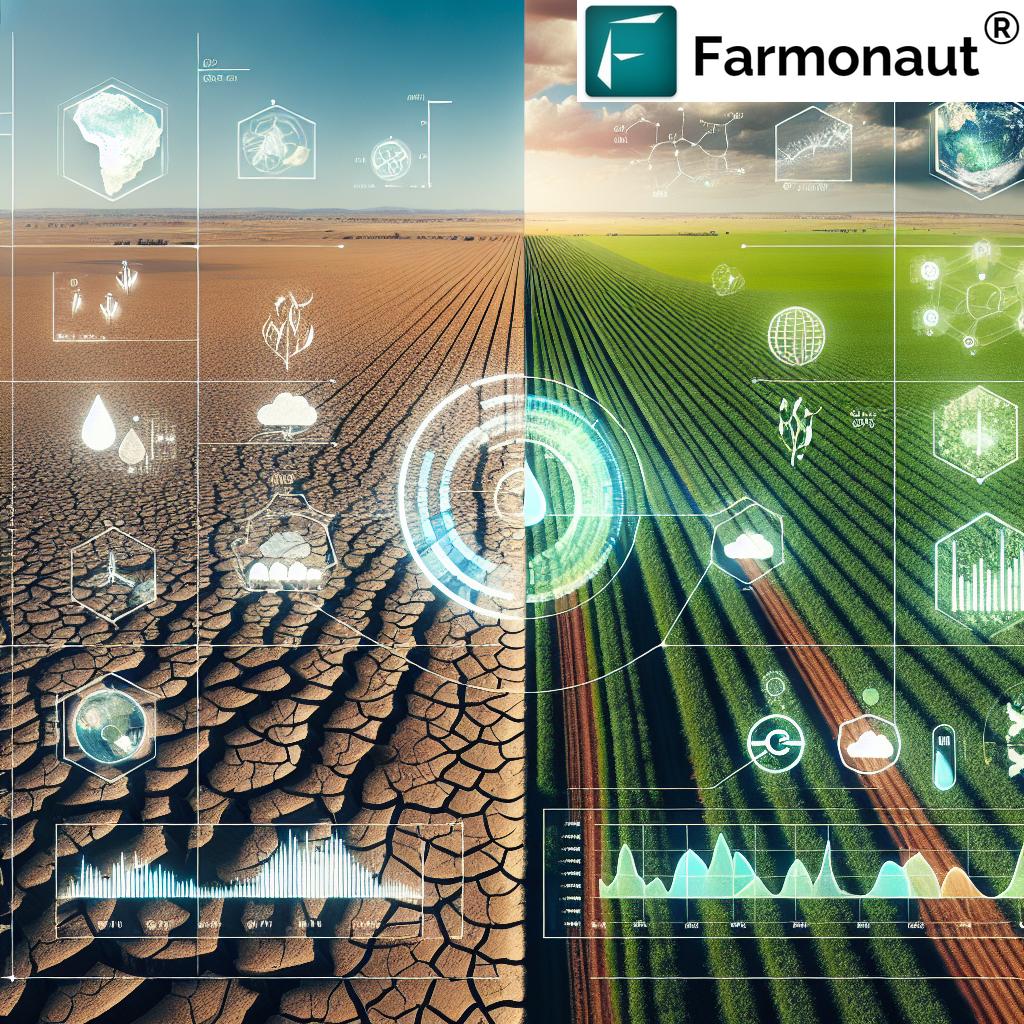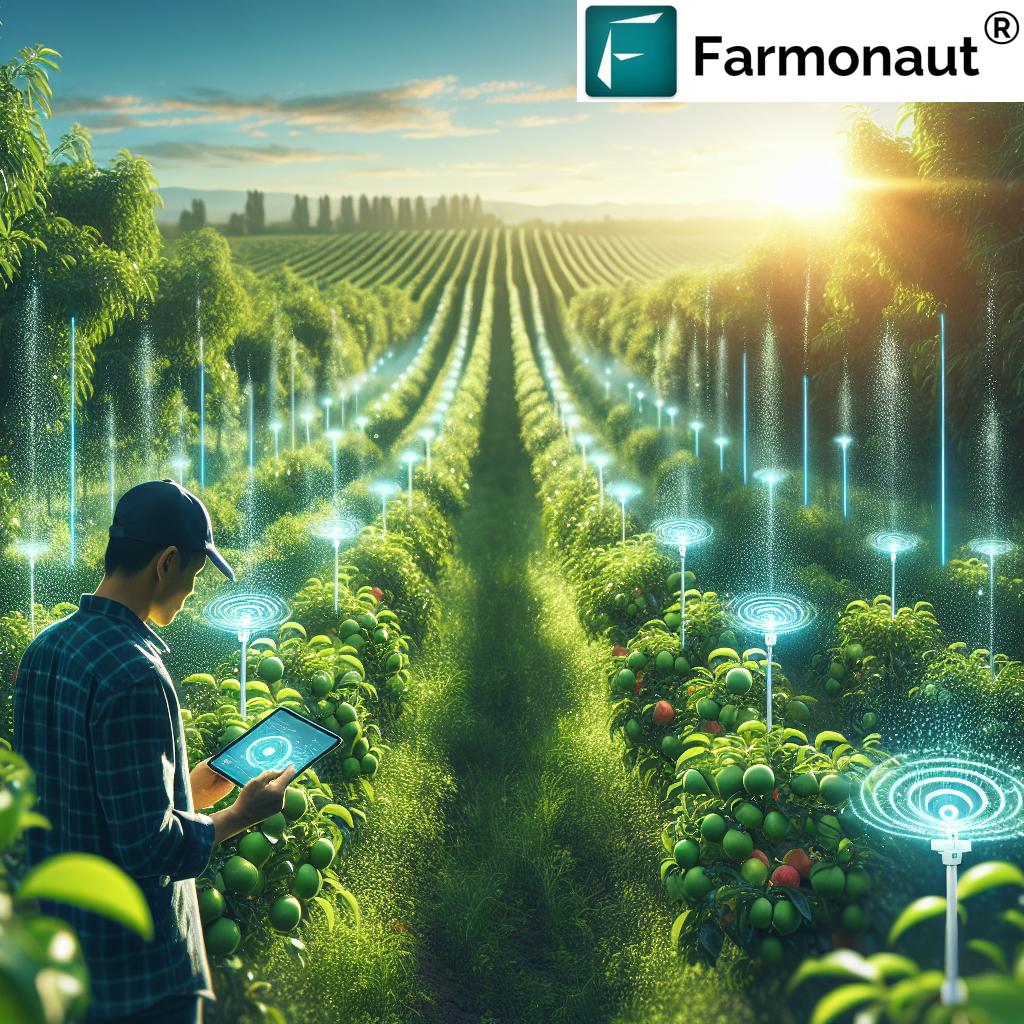Boosting Sustainable Tea Tree Oil Production: Innovative Nutrition Practices for Australian Plantations
“Australian tea tree oil plantations have increased yield by up to 30% through innovative nutrition practices.”
Welcome to our comprehensive exploration of sustainable tea tree oil production in Australia! We’re excited to delve into the world of innovative nutrition practices that are revolutionizing plantation management and shaping the future of this vital industry. As we journey through this blog post, we’ll uncover the latest advancements in agritech, research breakthroughs, and sustainable farming techniques that are propelling the tea tree industry forward.

The Importance of Sustainable Tea Tree Oil Production
Tea tree oil, derived from Melaleuca alternifolia, has long been a cornerstone of Australia’s agricultural exports. As global demand for this versatile essential oil continues to grow, so does the need for sustainable and efficient production methods. In this blog post, we’ll explore how innovative nutrition practices are transforming Australian plantation management, boosting oil yield, and enhancing crop sustainability.
But first, let’s take a moment to understand why sustainable tea tree oil production is so crucial:
- Environmental Conservation: Sustainable practices help preserve Australia’s unique ecosystems
- Economic Growth: The tea tree industry contributes significantly to rural development
- Quality Assurance: Proper nutrition ensures high-quality oil production
- Long-term Viability: Sustainable methods secure the industry’s future
Agritech Innovations in Tea Tree Plantations
The tea tree industry is embracing cutting-edge agricultural technologies to optimize production and sustainability. Let’s explore some of the most promising innovations:
Satellite-Based Crop Monitoring
One of the most significant advancements in tea tree plantation management is the use of satellite imagery for real-time crop monitoring. Platforms like Farmonaut are revolutionizing the way farmers track crop health and make informed decisions.
Key benefits of satellite-based monitoring include:
- Early detection of pest infestations and diseases
- Precise irrigation management
- Optimization of fertilizer application
- Improved overall plantation health
AI-Powered Advisory Systems
Artificial intelligence is playing an increasingly important role in tea tree oil production. AI-driven advisory systems analyze vast amounts of data to provide farmers with personalized recommendations for:
- Optimal planting times
- Nutrient management
- Pest control strategies
- Harvest scheduling
These intelligent systems help farmers make data-driven decisions, leading to improved yields and more sustainable practices.
Precision Agriculture Techniques
Precision agriculture is transforming tea tree plantations by allowing farmers to manage their crops with unprecedented accuracy. Some key precision agriculture techniques include:
- Variable Rate Technology (VRT) for precise fertilizer application
- Drone-based mapping and monitoring
- Soil sensors for real-time moisture and nutrient tracking
- GPS-guided machinery for efficient planting and harvesting
By implementing these technologies, tea tree farmers can optimize resource use, reduce waste, and improve overall plantation productivity.
Innovative Nutrition Practices for Tea Tree Plantations
At the heart of sustainable tea tree oil production lies innovative nutrition practices. These methods are designed to enhance soil health, boost plant growth, and increase oil yield while minimizing environmental impact.
Soil Health Management
Healthy soil is the foundation of a thriving tea tree plantation. Innovative soil management practices include:
- Cover cropping to improve soil structure and prevent erosion
- Composting and organic matter incorporation
- Biochar application to enhance soil water retention and nutrient availability
- Microbial inoculation to promote beneficial soil organisms
These practices not only improve tea tree growth but also contribute to long-term soil health and carbon sequestration.
Precision Nutrient Management
Tailoring nutrient application to the specific needs of tea trees is crucial for optimal growth and oil production. Innovative nutrient management strategies include:
- Soil testing and leaf tissue analysis for precise nutrient profiling
- Slow-release fertilizers for sustained nutrient availability
- Foliar feeding techniques for rapid nutrient uptake
- Custom-blended fertilizers based on plantation-specific requirements
By adopting these practices, tea tree farmers can ensure their crops receive the right nutrients at the right time, maximizing growth and oil production while minimizing nutrient runoff.
Water Management and Irrigation Innovations
Efficient water use is critical for sustainable tea tree oil production, especially in drought-prone areas of Australia. Innovative water management practices include:
- Drip irrigation systems for precise water delivery
- Soil moisture sensors for real-time monitoring
- Rainwater harvesting and storage techniques
- Mulching to reduce evaporation and conserve soil moisture
These water-smart practices not only conserve this precious resource but also contribute to healthier, more resilient tea tree plantations.
“Sustainable tea tree farming contributes to over 5,000 jobs in rural Australian communities, boosting local economies.”
Research and Development in Tea Tree Nutrition
Ongoing research plays a crucial role in advancing sustainable tea tree oil production. Let’s explore some of the exciting developments in this field:
Collaborative Research Projects
Australian research institutions are partnering with industry leaders to drive innovation in tea tree nutrition. Key areas of focus include:
- Genetic improvement for enhanced nutrient uptake efficiency
- Development of novel bio-fertilizers
- Studies on the impact of climate change on tea tree nutrition
- Exploration of beneficial plant-microbe interactions
These collaborative efforts are paving the way for more sustainable and productive tea tree plantations.
Field Trials and Demonstration Farms
To bridge the gap between research and practical application, field trials and demonstration farms are being established across tea tree growing regions. These initiatives:
- Showcase innovative nutrition practices in real-world settings
- Provide hands-on training for farmers and extension officers
- Collect valuable data on the long-term effects of sustainable practices
- Serve as hubs for knowledge exchange and community engagement
By witnessing the benefits of innovative nutrition practices firsthand, more tea tree farmers are encouraged to adopt sustainable methods.

Challenges and Solutions in Sustainable Tea Tree Oil Production
While the future of sustainable tea tree oil production looks promising, there are still challenges to overcome. Let’s examine some of these hurdles and the innovative solutions being developed:
Climate Change Adaptation
Challenge: Changing weather patterns and increased frequency of extreme events pose a significant threat to tea tree plantations.
Solutions:
- Development of drought-tolerant tea tree varieties
- Implementation of climate-smart agriculture techniques
- Use of advanced weather forecasting and early warning systems
- Diversification of plantation locations to spread risk
Soil Degradation
Challenge: Intensive farming practices can lead to soil erosion and nutrient depletion over time.
Solutions:
- Adoption of conservation tillage methods
- Implementation of crop rotation and intercropping systems
- Use of biochar and other soil amendments to improve soil structure
- Regular soil testing and targeted nutrient management
Pest and Disease Management
Challenge: Tea tree plantations are susceptible to various pests and diseases that can significantly impact yields.
Solutions:
- Development of integrated pest management (IPM) strategies
- Use of biological control agents and beneficial insects
- Implementation of early detection systems using satellite imagery and AI
- Research into natural plant defense mechanisms and their enhancement
The Role of Technology in Sustainable Tea Tree Oil Production
Technology is playing an increasingly important role in advancing sustainable tea tree oil production. Let’s explore how various technological solutions are being integrated into plantation management:
Remote Sensing and Satellite Imagery
Platforms like Farmonaut are revolutionizing tea tree plantation management by providing:
- Real-time crop health monitoring
- Early detection of stress factors
- Precise mapping of plantation areas
- Historical data for trend analysis and decision-making
By leveraging these tools, farmers can make data-driven decisions to optimize their plantations’ health and productivity.
IoT and Sensor Networks
The Internet of Things (IoT) is transforming tea tree plantations into smart, connected environments. IoT applications include:
- Soil moisture sensors for precise irrigation management
- Weather stations for localized climate monitoring
- Automated irrigation systems
- Real-time nutrient level monitoring
These interconnected systems provide farmers with unprecedented control over their plantations, leading to more efficient resource use and improved sustainability.
Blockchain for Traceability
Blockchain technology is being adopted to enhance transparency and traceability in the tea tree oil supply chain. Benefits include:
- Verification of sustainable production practices
- Enhanced consumer trust through product provenance
- Improved supply chain efficiency
- Reduction in fraudulent products entering the market
By implementing blockchain solutions, the Australian tea tree oil industry can strengthen its reputation for quality and sustainability in the global market.
Best Practices for Sustainable Tea Tree Oil Production
Drawing from the latest research and industry insights, we’ve compiled a list of best practices for sustainable tea tree oil production:
- Soil Health Management: Implement cover cropping, composting, and minimal tillage to maintain soil structure and fertility.
- Precision Nutrient Application: Use soil testing and foliar analysis to tailor nutrient applications to specific plantation needs.
- Water Conservation: Adopt efficient irrigation systems and water-saving techniques like mulching.
- Integrated Pest Management: Utilize biological control methods and early detection systems to minimize chemical pesticide use.
- Biodiversity Promotion: Maintain buffer zones and encourage native vegetation to support beneficial insects and wildlife.
- Technology Integration: Leverage satellite imagery, IoT sensors, and AI-driven analytics for data-driven decision making.
- Continuous Education: Participate in workshops, field days, and research collaborations to stay updated on the latest sustainable practices.
- Certification and Traceability: Pursue relevant sustainability certifications and implement traceability systems to enhance market value.
By adopting these best practices, tea tree oil producers can ensure the long-term viability of their plantations while contributing to environmental conservation and rural development.
The Future of Sustainable Tea Tree Oil Production
As we look to the future, several exciting trends and developments are shaping the landscape of sustainable tea tree oil production:
Emerging Technologies
- Advanced gene editing techniques for developing climate-resilient tea tree varieties
- Nanotechnology for enhanced nutrient delivery and pest control
- Artificial intelligence for predictive modeling and risk assessment
- Robotics and automation for precision planting and harvesting
Circular Economy Approaches
- Utilization of tea tree biomass for bioenergy production
- Development of value-added products from tea tree waste streams
- Implementation of closed-loop nutrient cycling systems
- Exploration of agroforestry models integrating tea trees with other crops
Market Trends and Consumer Preferences
- Growing demand for certified organic and sustainably produced tea tree oil
- Increased focus on fair trade and ethical sourcing practices
- Rising interest in tea tree oil’s therapeutic properties and natural cosmetic applications
- Expansion into new markets and product categories
Comparative Analysis of Tea Tree Oil Production Methods
To better understand the impact of innovative nutrition practices, let’s examine a comparative analysis of traditional and modern approaches to tea tree oil production:
| Production Method | Soil Nutrition Management Techniques | Estimated Oil Yield (L/ha) | Sustainability Score (1-10) | Environmental Impact | Implementation Costs ($/ha) | Long-term Benefits |
|---|---|---|---|---|---|---|
| Traditional | Conventional fertilizers, minimal soil testing | 150-200 | 5 | Medium | 1000-1500 | Moderate yield stability, potential soil degradation |
| Precision Nutrition | Tailored fertilizer blends, regular soil analysis | 200-250 | 7 | Low-Medium | 1500-2000 | Improved yield consistency, better soil health |
| Organic Farming | Compost, green manures, biological amendments | 150-200 | 9 | Low | 2000-2500 | Enhanced soil biodiversity, premium market access |
| Integrated Tech-Driven | AI-guided nutrition, satellite monitoring, IoT sensors | 250-300 | 8 | Low | 2500-3000 | Optimized resource use, data-driven decision making |
This comparison clearly demonstrates the advantages of innovative nutrition practices in terms of yield, sustainability, and long-term benefits. While implementation costs may be higher for advanced methods, the return on investment through improved yields and sustainability make them attractive options for forward-thinking tea tree oil producers.
Conclusion
As we’ve explored throughout this blog post, sustainable tea tree oil production is undergoing a remarkable transformation driven by innovative nutrition practices and cutting-edge technologies. From precision agriculture and AI-powered advisory systems to advanced soil health management techniques, Australian plantations are at the forefront of sustainable farming practices.
The challenges posed by climate change, soil degradation, and evolving market demands are being met with ingenuity and determination. By embracing these innovations, the tea tree oil industry is not only securing its future but also contributing to rural development, environmental conservation, and the growth of Australia’s agricultural workforce.
As consumers, researchers, and industry stakeholders, we all have a role to play in supporting and advancing sustainable tea tree oil production. By choosing sustainably produced oils, investing in research and development, and sharing knowledge, we can ensure that this vital industry continues to thrive while preserving Australia’s unique landscapes for generations to come.
FAQ Section
Q: What makes tea tree oil production sustainable?
A: Sustainable tea tree oil production involves practices that minimize environmental impact, conserve resources, and maintain long-term productivity. This includes using precision agriculture techniques, implementing soil health management strategies, and adopting water-efficient irrigation systems.
Q: How do innovative nutrition practices improve tea tree oil yield?
A: Innovative nutrition practices, such as precision nutrient management and the use of organic amendments, improve soil health and optimize nutrient availability for tea trees. This leads to healthier plants that are more resilient to stress and capable of producing higher oil yields.
Q: What role does technology play in sustainable tea tree farming?
A: Technology plays a crucial role in sustainable tea tree farming by enabling precision agriculture, real-time crop monitoring, and data-driven decision-making. Tools like satellite imagery, IoT sensors, and AI-powered analytics help farmers optimize resource use and improve overall plantation management.
Q: Are there any certification programs for sustainably produced tea tree oil?
A: Yes, there are several certification programs that recognize sustainably produced tea tree oil, including organic certifications and sustainability standards specific to essential oils. These certifications help ensure that the oil is produced using environmentally friendly and socially responsible practices.
Q: How can consumers support sustainable tea tree oil production?
A: Consumers can support sustainable tea tree oil production by choosing products that are certified organic or sustainably sourced, researching brands that prioritize environmental stewardship, and being willing to pay a fair price for high-quality, ethically produced tea tree oil.
For more information on sustainable agriculture solutions and satellite-based farm management, visit Farmonaut. Our platform offers cutting-edge tools to help farmers optimize their operations and embrace sustainable practices.
For developers interested in integrating our satellite and weather data into their own applications, check out our API and API Developer Docs.




















